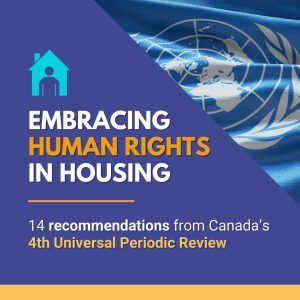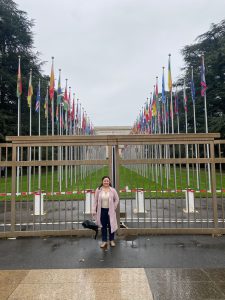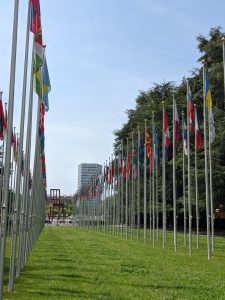In November 2023, Canada’s entire human rights record was analyzed under an international spotlight by United Nations (UN) member states to see how well Canada was doing on its domestic and international human rights obligations.
Ultimately, Canada received 122 recommendations on how the government can improve its implementation of human rights—including through its housing and homelessness policies and programs.

The Universal Periodic Review (UPR) is a unique process in which the human rights records of United Nations (UN) member states gets reviewed every 5 years by other UN member states.
Canada had its fourth Universal Periodic Review on November 10, 2023 to determine how well it was doing on its domestic and international human rights obligations. During the review, UN member states from across the globe analyzed Canada’s entire human rights record, asked direct questions, and ultimately made recommendations on how the Canadian government can improve its implementation of human rights—including through its housing and homelessness policies and programs.
Quick Backgrounder
 The National Right to Housing Network (NRHN) and the Canadian Centre for Housing Rights (CCHR) made a joint submission to this session of the UPR on the topic of inadequate housing and homelessness in Canada.
The National Right to Housing Network (NRHN) and the Canadian Centre for Housing Rights (CCHR) made a joint submission to this session of the UPR on the topic of inadequate housing and homelessness in Canada.
As part of this process, Seema Kawar from CCHR went to Geneva to participate in the UPR pre-session, where she engaged directly with state representatives before they participated in the official review, to make them aware of the ongoing inadequate housing and homelessness crisis in Canada—and Canada’s National Housing Strategy Act, which commits to treating adequate housing as a fundamental human right for all.
International human rights processes like the UPR are important to the right to housing movement in Canada because they offer layers of accountability that help ensure the Canadian government lives up to—and fully implements—its human rights obligations to fully realize the right to adequate housing for all.
In fact, Canada’s last UPR played a significant role in the passing of Canada’s first right to housing legislation, the 2019 National Housing Strategy Act. Canada is also currently seeking a seat on the United Nations Human Rights Council, which means its efforts to implement recommendations from the UPR are even more important for demonstrating its human rights leadership and commitment to resolving Canada’s housing and homelessness crisis.
14 Key Recommendations for Housing
Throughout the the recommendations made to Canada at its 4th Universal Periodic Review, the National Housing Strategy Act was directly referenced four times, and the theme of ensuring adequate housing and ending homelessness echoed throughout. The following is an overview of the 14 recommendations Canada received to strengthen the right to housing:
On the National Housing Strategy & National Housing Strategy Act

6.168 Take the necessary measures to facilitate access to housing for vulnerable persons (France).
6.169 Address the issue of homelessness through tangible goals and timelines, especially regarding marginalized groups (Germany).
6.170 Step up efforts to ensure the right to adequate housing and achieve clear goals for eliminating all forms of homelessness in accordance with the National Housing Strategy Act (Greece).
6.171 Implement fully the National Housing Strategy Act to eradicate housing insecurity faced by minority groups, particularly indigenous women, LGBTQIA+ persons and children (Brazil).
6.172 Strengthen the National Housing Strategy including by providing adequate allocation to housing programmes to effectively address the housing needs of people experiencing homelessness and housing precarity (Malaysia).
6.173 Strengthen measures to reduce homelessness, in particular among children, who are vulnerable to housing insecurity, in alignment with the National Housing Strategy Act (Republic of Korea).
6.174 Implement fully commitments under the National Housing Strategy Act and ensure that those most in need, particularly vulnerable groups and Indigenous Peoples, have adequate and affordable housing (Austria).
|
For Context: The 2019 National Housing Strategy Act (NHSA) is Canada’s first legislation that officially recognizes adequate housing as a fundamental human right (also known as the “right to housing,” for short). This legislation brings Canada in line with international law and standards which require Canada to apply a human rights-based approach to housing throughout all of its laws, policies, and programs (including Canada’s 2017 National Housing Strategy), by:
To learn more about the National Housing Strategy Act legislation, click here. To learn more about the human rights-based improvements needed in Canada’s National Housing Strategy, which holds all of the federal government’s housing policies and programs, click here. |
Implementing Economic, Social and Cultural Rights
6.36 Ratify the Optional Protocol to the International Covenant on Economic, Social and Cultural Rights (Portugal).
6.165 Ensure that economic, social and cultural rights can be effectively exercised by all people in Canada, including by people with disabilities (Cyprus).
6.166 Strengthen efforts to protect the economic, social and cultural rights of minority communities, and migrants, especially their right to adequate housing (Pakistan).
|
For Context: The International Covenant on Economic, Social and Culture Rights (ICESCR) is a United Nations international human rights treaty which Canada signed on to in 1966, and which came into force in 1976. It addresses a wide range of economic, social, and cultural issues, including healthcare rights, education rights, and the right to adequate housing. Canada’s right to housing legislation—the 2019 National Housing Strategy Act—commits Canada’s governments to the progressive implementation of the right to adequate housing as guaranteed under the ICESCR. However, many advocates and human rights experts agree that Canada has not yet effectively implemented this commitment throughout its housing policies and decisions. Additionally, the Optional Protocol to the ICESCR is an international treaty that enables victims of economic, social, and cultural rights violations to present complaints at the international level—especially if they cannot access justice in the courts of their home country. Canada has not signed on to this Optional Protocol. |
Ensuring Adequate Supports and Services for Those in Greatest Housing Need
6.163 Ensure that all children and their families living in poverty receive, without discrimination, adequate accessible services and financial support, including with the aim to end homelessness among children (Romania).
6.167 Adopt measures to provide social support to people in need of housing (Belarus).
6.181 Adopt a concrete strategy to strengthen access to quality health services and adequate housing, primarily for Indigenous Peoples, Afro-descendants, migrants and refugees (Mexico).
6.278 Continue to take steps to ensure that persons with disabilities are lifted out of poverty, including by ensuring that the 2023 Canada Disability Benefit Act takes into account the higher disability related living expenses of persons with disabilities (New Zealand).
|
For Context: Canada’s 2019 National Housing Strategy Act requires that all of Canada’s housing policies and programs ensure the right to adequate housing. This mandate includes requirements to ensure independent monitoring mechanisms, access-to-justice mechanisms, and the provision of effective remedies—all while prioritizing those from marginalized communities and those with the greatest need for housing. To achieve adequate housing for all, Canada must also address intersecting issues like poverty among the most marginalized through social support, accessible and quality health services, and financial support (like strong income supports). Access to necessary services like healthcare is a key element of the right to adequate housing. |
The UPR and Canada’s Right to Housing
At Canada’s last three UPRs, the federal government received 21 recommendations related to the right to housing, including calls to:
- Implement a national housing strategy to address the housing crisis;
- Adopt legislation that recognizes the right to housing;
- Take measures to reduce homelessness and poverty, and;
- Implement strategies to address housing inadequacy for Indigenous Peoples.

These past UPR recommendations all helped pave the way for Canada’s 2017 National Housing Strategy—which holds all of the federal government’s housing policies and programs—and Canada’s very first right to housing legislation, the 2019 National Housing Strategy Act (NHSA).
We at the National Right to Housing Network and the Canadian Centre for Housing Rights therefore recommend that the Canadian government accept and implement the 14 new right to housing recommendations offered by other UN member states. Doing so will not only advance the right to housing in Canada, but also ensure that all levels of government within the country actually comply with their right to housing commitments under the NHSA and international law.
National Leadership to Advance the Right to Housing
Access to safe, adequate, and accessible housing is a key determinant of health, and in turn, influences other social issues such as poverty and access to education—yet Canada continues to face a housing affordability and homelessness crisis. Despite its human rights obligations, it has not established clear goals and timelines to reach the target of eliminating homelessness. It also continues to underinvest in social housing, accessible housing, and for-Indigenous by-Indigenous housing, among other policy issues that most affect low-income and already-vulnerable communities.
Additionally, Canada has yet to revise the National Housing Strategy to ensure that it complies with the rights-based approach set out in the NHSA, which requires, among other things, that Canada prioritizes those in greatest housing need throughout all its policy and budgetary decisions.
With Housing Minister Sean Fraser having recently announced that a more comprehensive plan to tackle the housing crisis is coming—including measures that should provide help for those in deepest housing need—we know that this is a priority for the federal government.
To that end, we are anticipating the federal government to uphold its human rights commitments by accepting and implementing the recommendations set out by the Universal Periodic Review. This will be a strong demonstration of its national leadership, both domestically and on the international stage, in resolving these pressing issues and improving access to adequate housing for all.
Additional Resources
- We conducted an interview with Seema Kawar, CCHR and NRHN’s representative at the UPR pre-session. There, she provides a more in-depth explanation of what the UPR is, how it works behind the scenes, and her personal experiences engaging with this critical international human rights process. Seema’s full interview can be found here.
- In 2022, the National Right to Housing Network, Women’s National Housing and Homelessness Network, and National Indigenous Housing Network engaged directly with Canada’s review under the UN Convention on the Rights of the Child, achieving key housing and homelessness recommendations that were referenced by UN member states in this 2023 UPR. Read about the housing recommendations that came out of the Committee on the Rights of the Child here.



